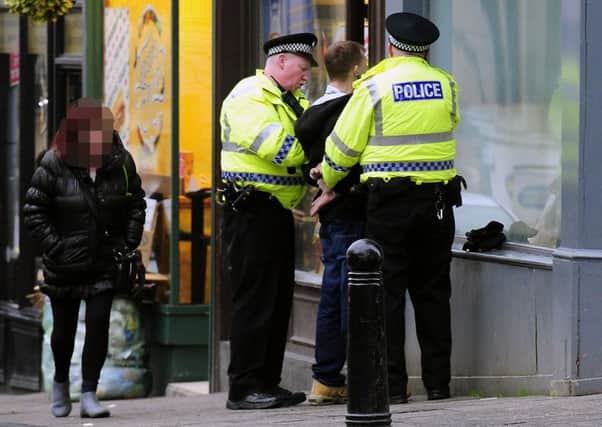Stop-searches '˜not a factor' behind rise in violent crime


A review of the controversial tactic by HM Inspectorate of Constabulary in Scotland (HMICS), which will be published today, charts a significant fall in the use of non-statutory stop and search since 2015.
But The Scotsman understands that analysis carried out by local police divisions found falling numbers of stop-searches are not a “causal factor” in an increase in some forms of violent crime.
Advertisement
Hide AdAdvertisement
Hide AdThe tactic of non-statutory or “consensual” stop and search is due to be outlawed with the introduction of a new code of practice in May. Police officers will then only be able to stop and search people when they have “reasonable grounds for suspicion” based on information or intelligence received.
Concerns have been raised that the ending of non-statutory stop and search could lead to a rise in knife-carrying.
Figures released last year showed police had recorded an increase in violent offences such as serious assault and robbery despite an overall fall in crime levels.
HMICS said consensual searches now account for around 4 per cent of the total number of police searches, compared with 70 per cent in 2015.
The watchdog had previously raised concerns about Police Scotland’s handling of stop-search data, but said it now had confidence in the “accuracy and integrity” of the statistics.
It said there had been a 67 per cent reduction in the number of stop-searches recorded, which is put down to a number of factors, including the scrapping of police performance targets and the more accurate recording of alcohol seizures.
HM Chief Inspector of Constabulary Derek Penman said: “Since our Phase 1 report was published in 2015, Police Scotland has delivered substantial improvements in the way it conducts, records and monitors all of its stop-and-search activity.
“The number of recorded stop-searches by police officers has decreased significantly, with the majority now using legislative powers.
Advertisement
Hide AdAdvertisement
Hide Ad“Seizures of items, including alcohol, are recorded separately and provides more accurate information on stop-and-search activity. There is also far greater transparency through the publication of stop-and-search data on the Police Scotland website, which creates new opportunities for external scrutiny.”
Chief Superintendent Barry McEwan, head of Safer Communities at Police Scotland, said: “Police Scotland recognises that stopping and searching members of the public is a significant intrusion into their personal liberty and privacy and we are committed to ensuring that all stop-and-search activity is carried out in a lawful, proportionate, justifiable and accountable manner.
“Stop and search is intelligence-led and a valuable policing tactic which contributes to the prevention, investigation and detection of crime, while at the same time keeping people safe and improving community well-being.”